His name was Peter Lewin. He was a history teacher who could command a room with a snap of his fingers. He held the class by never losing his temper: simultaneously, he would occasionally front a facade of anger, each well-timed outburst designed to put the difficult students firmly in their place. He looked a little like Sir Clive Sinclair, and some time after I grew up he left the Grant Maintained Comprehensive where I’d spent my formative years, and went off to drive a tour bus at a ski resort somewhere in Switzerland. So we hear, at least, and it would be nice to think that this is what happened.
One of the things I remember from that first GCSE module was crop rotation. You would do two years on, he explained, and then a year off, to allow the land the time it needed to recover. The three field system adopted at the end of the middle ages meant that you always had two working fields, while the third was being rested; this allowed for the production of newer and better vegetables. It wasn’t a perfect system, but it worked.
But the notion of fallow years has never sat comfortably with Doctor Who fans. For many, it hearkens back to the dark days of 1986, when the show was rested for a grand total of 18 months while the powers that be tried to work out what on earth was wrong with it (post-match analysis confirms it was a combination of lousy stories and the characterisation of Colin Baker). For others, it’s simply the idea that they’ll have to wait for the calendar to rotate before they get any new content. Never mind that it’s expensive to produce; the BBC are loaded, aren’t they? How come you can foot Graham Norton’s dry cleaning bill and churn out series after series of Strictly but you can’t manage a dozen episodes of Peter Capaldi running up a corridor? Is this why I pay my license fee?
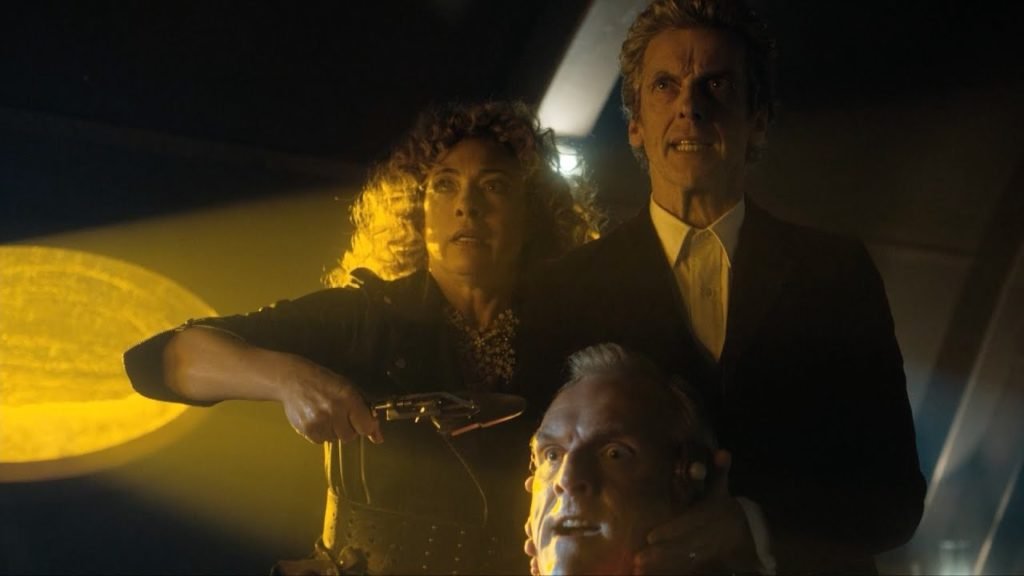
And yet there we were, back at the tail end of 2015, back when the White House still had a shred of dignity, and Brexit wasn’t even a word, and it seemed that the only thing worth getting angry about was the fact that The Husbands of River Song (penned, as is its follow-up episode, by Moffat) would be the last we’d see of Capaldi and his chums – if you don’t count Class – for an entire year. For his part, the Doctor would spend his downtime on a balcony staring at a couple of rocks for about a quarter of a century. The following Christmas, he’d play Cupid to a haphazard couple in present day New York. He’d also inherit a squeaky toy that bore an uncanny resemblance to his next companion. Go figure.
What strikes you, when you watch these episodes more or less back to back (as opposed to sandwiching a whole 12 months between them) is just how similar they are. They’re stories of duplicity and deception and mistaken identity – one lead character hides his name, the other hides his face – where an obvious narrative gap is bridged by a woman long dead. The same zip-headed alien species permeates both specials, although neither story is really about them. And they both have crashing spaceships. Actually, quite a few Doctor Who Christmas specials feature crashing spaceships – witness Voyage of the Damned, The End of Time, and A Christmas Carol, all of which come under the banner of “We’ve got a pyrotechnics budget and we’re going to use it”. As long as there’s an explosion or two, everybody’s happy.
There may be pyrotechnics, but Capaldi’s gap year was more about character than it was about spectacle: two stories, with a wealth of off-screen adventures between them, as is Moffat’s wont. The figure at the centre of both is a man who sports different scars from different losses: it is the reintroduction of one companion who helps him cope with the departure of another, and the tales that unfold are tales of grieving and of acceptance, carpe deum-esque narratives both of going through the motions and seizing the day, according to mood. The off-world setting of the first is not an accident; nor, in the 2016 follow-up, is the decision to go home – or at least to Earth, which is basically the same thing. There is a certain amount of (largely metaphorical) demon-facing in both stories, but never at the cost of the narrative, which – particularly in the first episode we’re going to cover – zips along at the pace of a troika crashing down a mountain.
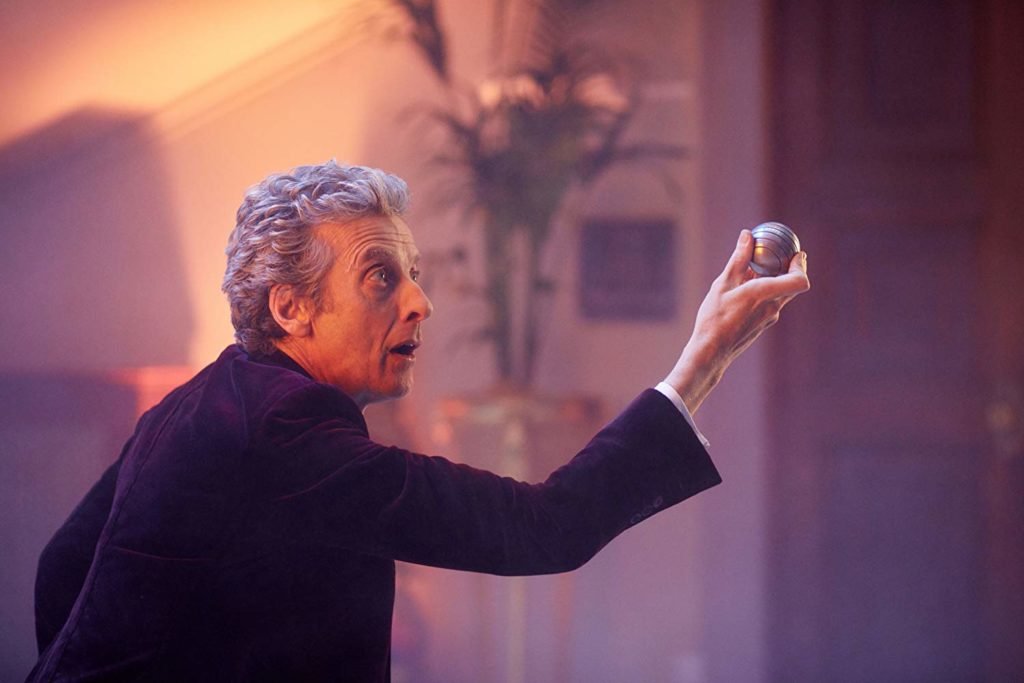
As The Husbands of River Song begins, the Doctor opens the TARDIS onto a wintry landscape, wearing a pair of antlers. It is about the most Christmassy moment in what is essentially a madcap caper across time and space, from a cyberpunk medieval village to a luxury cruise liner to a rocky alien world, all shot with flair by Douglas Mackinnon and Director of Photography Suzie Lavelle. River (who hasn’t seen the Doctor in years) has a plan to get rich quick, by selling a valuable diamond to the highest bidder with the help of the strange white-haired gentlemen who’s trailing behind in her wake. But first, they’ll have to surgically remove the diamond from its current home – inside the skull of the absurdly named King Hydroflax. The malevolent despot is played by Greg Davies in what is to all intents and purposes a talking head role; Davies makes the most of it by yelling a lot, a clear throwback to the glory days of Doctor Who in which the villains generally got what they wanted by chewing up the scenery. As a consequence, he comes a sort of cross-bred hybrid, the love child of the Pirate Captain and Omega, and for all we know that’s exactly who he is.
It scarcely needs explaining, but the in-joke in Husbands is that River calls every shot whilst remaining blissfully unaware of her new sidekick’s true identity. It’s a joke that is stretched to breaking point and beyond – we know that Dr Song’s awareness of regeneration doesn’t stretch to the Time War, but having Capaldi drop in constant references to his nom de plume swiftly becomes tiresome, and by the time she fails to pick up what he means by “I’m quick… for a Doctor”, you’re about ready to shove the sonic trowel down her throat. In many ways, it’s nice to have a story where the Doctor, for once, has River at a chronological disadvantage, but the decision to milk it for the best part of an hour is something of a misstep.
This is all there, of course, so that Moffat can engineer the sort of overwrought, overwritten, and overacted speech which was always the very worst of the character, and as the petulant archaeologist delivers her tale of unrequited love to a room full of arch criminals, talking about the admiration of sunsets, it’s frankly a miracle that one of them doesn’t pull the trigger just to shut her up. As an emotional climax, it almost works: as decent, plausible drama, it simply doesn’t. It’s difficult to know just how much of this to blame on Kingston herself and how much on the turd she’s desperately trying to polish, but we’re in chicken and egg territory here, and one suspects that River is prone to melodrama because Kingston does it so well, if you like that sort of thing. The rest of us are sitting there, anxiously drumming our fingers, waiting for Capaldi to steal the scene with a single, murmured “Hello, sweetie”.
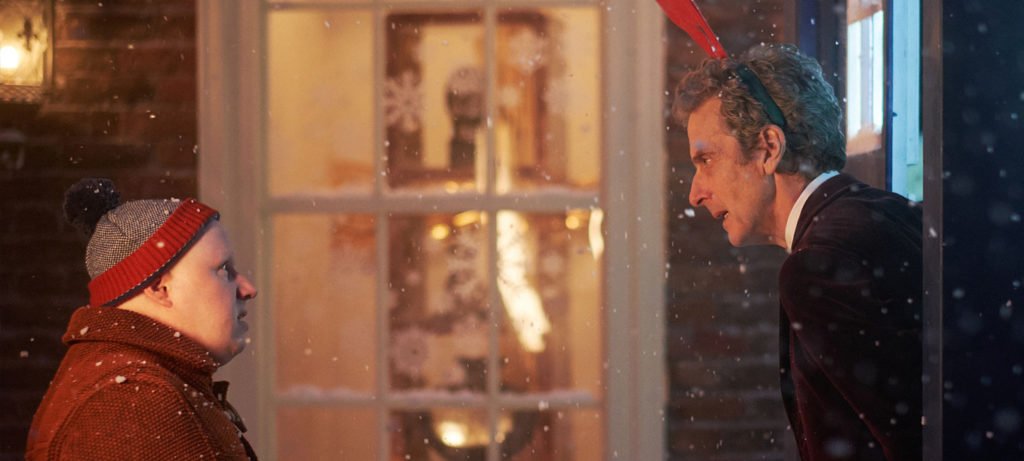
In the end, the narrative – not to mention the planet’s astrophysical state – are both engineered in order to give the Doctor and River a bit of time to themselves before she pops off to the library. We might almost call it cheap if it weren’t so beautifully rendered: a pair of ageless travellers lingering on a balcony before two immortal monuments, locked in a musical symbiosis that we can admire even if it’s one we will never fully understand. The imagery is transparent but, for a change, almost subtle, and River’s gasp of amazement as the prospect of spending some quality time with the man she loves finally kicks in is both palpable and strangely heartwarming. There is no happy ending, but there is a brief stay, and as the credits roll you sense that everything’s going to be fine.
It helps that the two of them have some wonderful chemistry. Kingston’s character never really worked with Smith; he’s a talented actor but his Doctor did not lend himself to love stories and, at the risk of sounding ageist, it always looked like a teenager hitting on his best friend’s mum. There is none of that this time around – no awkward jokes about orgasms or flirting in the midst of a gun battle. It may be down to the advanced stage in their relationship, or the fact that the two of them are finally on an even keel, but River is so at ease with Capaldi’s incarnation you feel as if this is the pairing that Moffat had intended all along, and it’s a great shame that her story ends here.
Still: end it does, and the next time we catch up with the Doctor he’s in New York, doing his utmost to fix the damage he caused in The Angels Take Manhattan (and arriving, somewhat conveniently, just after Amy and Rory’s assumed deaths, or else opting to stick his head in the sand and pretend they’re not there). A simple misunderstanding leads to eight-year-old Grant accidentally being given superpowers, which he promises, presumably with a crossed finger behind his back, not to use – at least until the present day, when a masked Green Lantern wannabe (Justin Chatwin, Shameless) is patrolling the streets, upturning trapped buses and lecturing about fire safety. In the midst of this, the Doctor crosses paths with intrepid reporter Lucy (Charity Wakefield) as she pokes around the sunlit offices of megacorporation Harmony Shoal, who have plans for the most hostile of hostile takeovers.
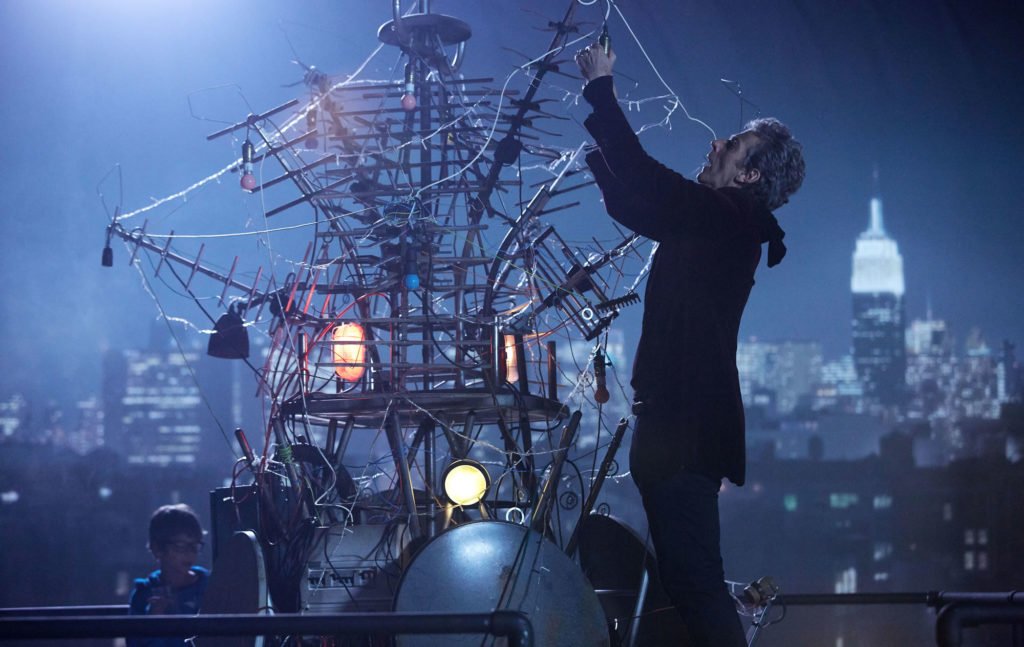
The Return of Doctor Mysterio plays on several tropes, most of which pay affectionate homage to the superhero genre. From the multi-panelled screen splits during Grant’s phone call to the Doctor’s conspiratorial whisper that Superman and Clark Kent are the same person, nothing is untapped – but Moffat delivers his take on costumed heroes with respect and dilligence and never allows it to descend into outright parody. It’s the same approach adopted by Simon Pegg and Edgar Wright in the likes of Hot Fuzz, and it works there, as it does here, because both writers understand and appreciate the medium they’re trying to ape. Hence when Lucy fails to grasp, for the umpteenth time, that the man she’s employed as her nanny is the same person she’s invited to dinner on her apartment rooftop (a scene that directly evokes at least a couple of the Superman films), we don’t give her a hard time, because the notion of a brilliant investigative journalist who can’t see past the end of her nose is both understandable and reassuringly familiar.
There are Shakespearian undertones to this: disguises in the likes of The Winter’s Tale and King Lear are usually entirely unnoticed by everyone but the audience, who is in on the joke. Translating it to the big screen is largely a matter of interpretation: witness Christopher Reeve’s brilliant, bumbling Clark Kent, borderline unrecognisable next to his alter-ego, versus Dean Cain’s, who was essentially Superman in a shirt and tie, and who leaves you wondering how the hell he got away with it for so long. Chatwin plays it somewhere between the two, taking Christian Bale’s gravelly Batman as a clear source of inspiration, although even then it all gets a little bit silly to be truly believable, which is entirely the point and all part of the fun. As Blake Lively remarks to Ryan Reynolds halfway through Green Lantern, “I’ve seen you naked – you don’t think I would recognise you because I can’t see your cheekbones?”
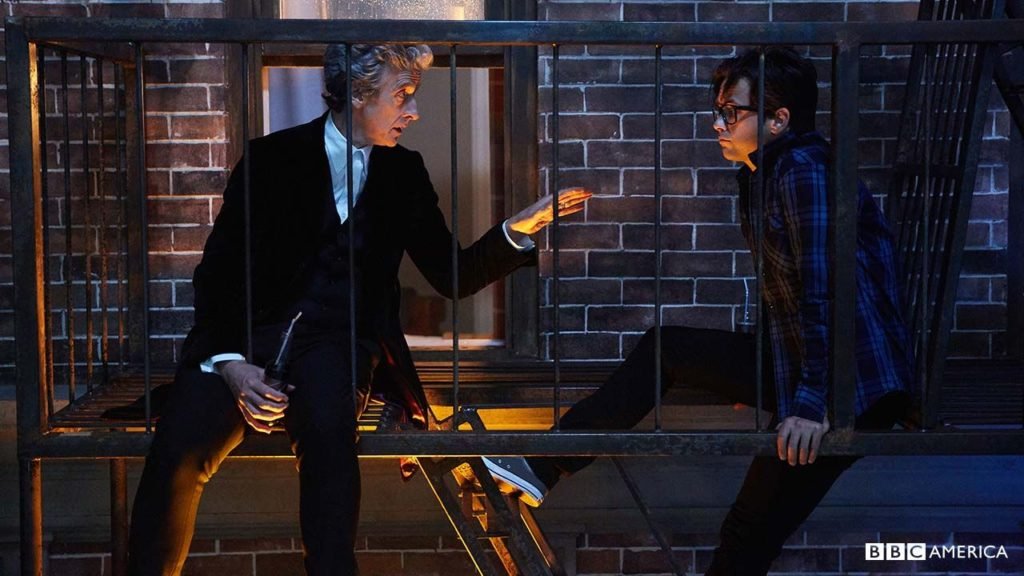
Throughout the whole thing, Capaldi is calm and capable, eccentric without being ridiculous and flippant without being cruel. Affable support is provided by Nardole (Matt Lucas), who guest-stars both in Mysterio and Husbands, playing quite different characters in both: the Nardole of Husbands is squeaky and panicky, while the reassembled, robed Nardole who later flies the TARDIS cuts a calmer and altogether more appealing figure, cracking jokes and cutting to the dual heart of the Doctor’s emotional state without even needing to read his body language. It’s like watching episodes of The Black Adder and Blackadder the Second in sequence. Lucas is frankly a revelation, and the decision to keep him on for Series 10 would prove to be a winning one, not least because he seems to understand his master on the sort of level to which most companions can only faintly aspire. “You cut me out of Hydroflax,” he reminds the Doctor, “because you were worried you’d be lonely. But oh, look at you, avoiding the subject.”
It’s a strange state of affairs when you’re more worried about the repercussions of a man removing his glasses than you are about an atomic engine destroying New York, but that’s not necessarily a bad thing; it’s just a question of a priority rethink. In either event the villain is arguably the story’s weakest element: the brain-swapping conspiracy engineered by Harmony Shoals is the oldest trick in the book, but it could have been far more interesting had there been a bit of backstory, or motivation, or simply a little flesh on the bones. Unfortunately, the Doctor is so busy matchmaking, he doesn’t have time to explore this properly, leaving behind a flurry of uninterrupted confrontations and expository conversations over monitors; the net result is that we care far less about the prospective end of the world than perhaps we ought. It’s not out of character – Moffat realised, comparatively late in his Who tenure, that smaller, more personal battles were far more fun to write than the universe-shaking grandeur of which his predecessor was so fond – but there are times you wish you could understand these people a little better, even with the subtitles on.
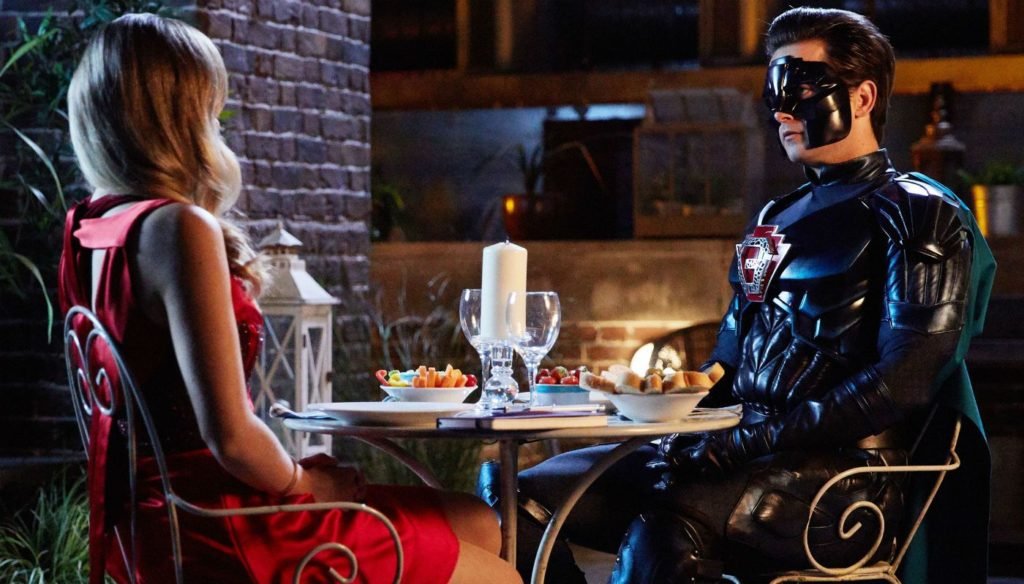
And yet for all the unanswered questions (what’s the beef with Harmony Shoal? Do Grant’s faster-than-a-speeding-bullet tendencies extend as far as the bedroom? And WHERE THE HELL DID THE DOCTOR PUT HIS SUSHI?) it’s hard not to feel satisfied. This is, ultimately, a love story, and it’s testament to the Twelfth Doctor’s character growth that he is able to draw on past experiences while keeping the cynicism at bay – “There’s somebody worse at this than me”, we’re gleefully told at the halfway point, before the episode wraps up with some of the most poignant advice ever delivered on the show. “Everything ends,” Capaldi announces to the room, “and it’s always sad. But everything begins again too, and that’s always happy.”
We’d never really see him happy again. But he would be content, and find a new purpose, and perhaps that’s enough. Capaldi’s character trajectory is perhaps peerless among his contemporaries, and the Christmas episodes that partition his somophore and final appearances are a beautifully mapped journey through familiar territory, which really is no bad thing. At the risk of cliche-mining, the gap year tales are paradise lost and regained and lost again, as seen through the eyes of a man who has learned to process the experience without bitterness or regret. Of all the Doctors who could have taken River to the Singing Towers, I’m glad it turned out to be this one.
NEXT: It means, what the hell?
